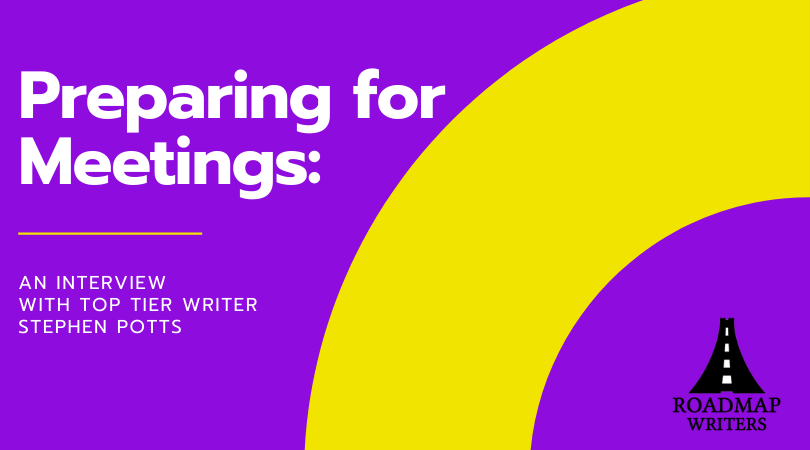
I recently traveled to LA from home in rural Scotland for a week of meetings, my fourth such trip since spring 2016. I had eleven meetings in total. Some were with people I’d connected with previously at film markets in Berlin (EFM) and Santa Monica (AFM), some with execs I had worked with in Roadmap’s development programs (Matchmaker and Incubator, and Consultations). Others were bonus balls set up by Joey (to my great appreciation.) The execs were a mixture of reps (both in management and agencies), and development specialists in production companies.
Coming all the way to Los Angeles from Scotland is not the easiest thing to do. What made you say “I HAVE" to come out there?
In recent years, I have progressed from written pitches, to short verbal pitches, to long verbal pitches, to hour consults. While Zoom and Skype can work wonders in shrinking distance, it’s still the gold standard to be in the room when pitching. There’s a different dynamic, more time, and a more relaxed atmosphere. The only way to get that is either to move to LA ( which I can’t do for family and day job reasons) or visit as often as possible. Sure, it’s a hassle, having to make arrangements at work and at home (kids, dogs) and it ain’t cheap - but on each visit I feel I’ve made a step up. That was definitely true on this most recent trip.
What kinds of genres/formats do you like to write in?
Having started as a novelist writing historically-set kids’ adventure fiction, it was natural I should start by carving a niche in historically-set adaptation, but I’m trying to get beyond that now. Most of my 10 features and 2 TV pilots are period pieces (spanning medieval England to WW2), but I have also written contemporary medical drama and both political and crime thrillers
First, I had to have a portfolio of projects I could pitch. I took two features and two TV pilots, and was prepared to talk about others. I don’t see much point in going all that way with one script. Second, I set the date well in advance, and let everyone in my contact list know about it. This included Joey, and all the execs who had requested scripts or asked to stay in touch after Roadmap’s pitch sessions. Not everyone responded, and to be honest my diary was looking a bit thin a few weeks out. But schedules change all the time, often at short notice, and by the time I left home I had a good list of meetings set up.
I had practiced pitching the projects enough in round tables through Roadmap, that I was confident I could talk about them in a conversational way, and not by just reading from a script - of which I have been guilty in the past - though I still had a few prompts with me I could refer to if I lost my thread mid-pitch.
Once I knew who I’d be pitching to, I researched the exec and their company. There’s a lot of information available via the Roadmap website as well as some other resources.
I thought it was important (and frankly also courteous) to show the exec that I had taken the trouble to find out what I could about them, their company, the kind of work that had done, the kind of things they looked for. And several showed that they had researched me and my background, via my personal website (www.stephenpotts.net).
What kind of leave behind did you prepare to give the execs?
In course of developing two of the projects I took out, I had prepared outlines and treatments which included photographs and other images intended to convey the worlds in which the stories took place. I tried to match the images up with my own text but soon learnt I have zero skills as a graphic designer, so I commissioned a local specialist to build my text and images into one 8-page “pitch packet” for my 16th century TV pilot, and a “one sheet” for a feature film set at the Nuremberg war crimes tribunal. Again these were not cheap, but seeing the reaction of the execs when they looked at them, I immediately knew it was worth it.
For the general meetings, how much of that time was dedicated to pitching and how much of the time was dedicated to just getting to know each other?
Hard to be sure, but I’d say more than half the time I ended up pitching whichever project the exec most wanted to hear about. Sometimes I was expected to lead with the pitch, and sometimes with my background. There was no set format.
Did your general meetings differ between reps and execs?
Not really, though the meetings did vary very widely in length, setting, and content, irrespective of whether the exec was in representation or production.
What is the biggest piece of feedback you would give writers going into a general meeting?
Prepare, prepare prepare - but not to the point of inflexibility. Do expect the meeting schedule to change right up to the last minute , and don’t expect the meeting to go the way you have prepared for: and don’t stick to your meeting script if things take a different direction. One exec, with whom I had a general meeting, was intrigued by a passing reference to my medical drama in the bio Joey had sent her, and we talked about that, straight off the bat. The discussion was very welcome, though not what I was expecting - but because I had pitched the project many times before, in writing and via Zoom, I was able to pivot, and we spent forty valuable minutes discussing it .